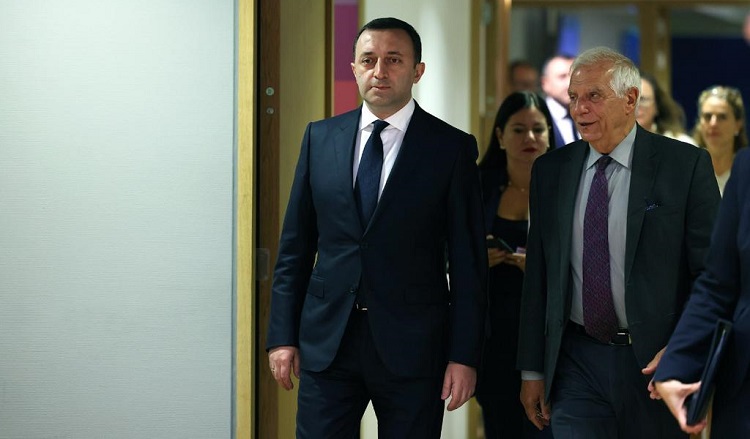European Council’s June decision “confirmed Georgia’s clear EU perspective” - EU High Representative Borrell

Josep Borrell, the EU High Representative for Foreign Affairs and Security Policy, called on Georgian political actors to unite for Georgia’s European Union membership candidacy. Photo: Government of Georgia press office
Josep Borrell, the European Union High Representative for Foreign Affairs and Security Policy, said the European Council had “confirmed Georgia’s clear European perspective” in June, in comments following the EU-Georgia Association Council meeting in Brussels on Tuesday.
Stressing the importance of the Council meeting he co-chaired, with the gathering held for the first time since Georgia gained the European perspective from the Council and was given several months by the Council to address its 12-point conditions for obtaining the EU membership candidate status, Borrell said “political forces of Georgia should seize this historic opportunity”.
In his previous comments, the EU official had stated joining the EU was a “merit-based process, there are no shortcuts, no detours, there is a political will, a political declaration that will grow into results, and only visible, accessible and tangible outcomes lead to progress on this path”.
Chaired the first EU - Georgia Association Council since #EUCO confirmed #Georgia’s clear EU perspective.
— Josep Borrell Fontelles (@JosepBorrellF) September 6, 2022
Political forces of Georgia should seize this historic opportunity to advance on the EU path. The EU stands ready to accompany you along the way. pic.twitter.com/PEUvHSbIuX
Co-chairing the meeting, Georgian Prime Minister Irakli Garibashvili said his Government had taken the European perspective with “great responsibility” to ensure the “highest political and economic compatibility with the European Union”, and stressed it was doing “its utmost” to gain the EU candidacy for the country.
In further details, the PM said that “immediately” after the European Council had granted Georgia the European perspective, Georgian Dream authorities had presented a strategy to fulfill the 12-point conditions for the membership candidate status and invited “all political actors” and the civil society to participate in the “inclusive process”.
However, Garibashvili noted that despite the ruling party and the Georgian Government “opening doors” to “all political players”, some of the domestic political parties - including the United National Movement, the largest opposition party - had refused to participate in the work.
 Tweet
Tweet  Share
Share